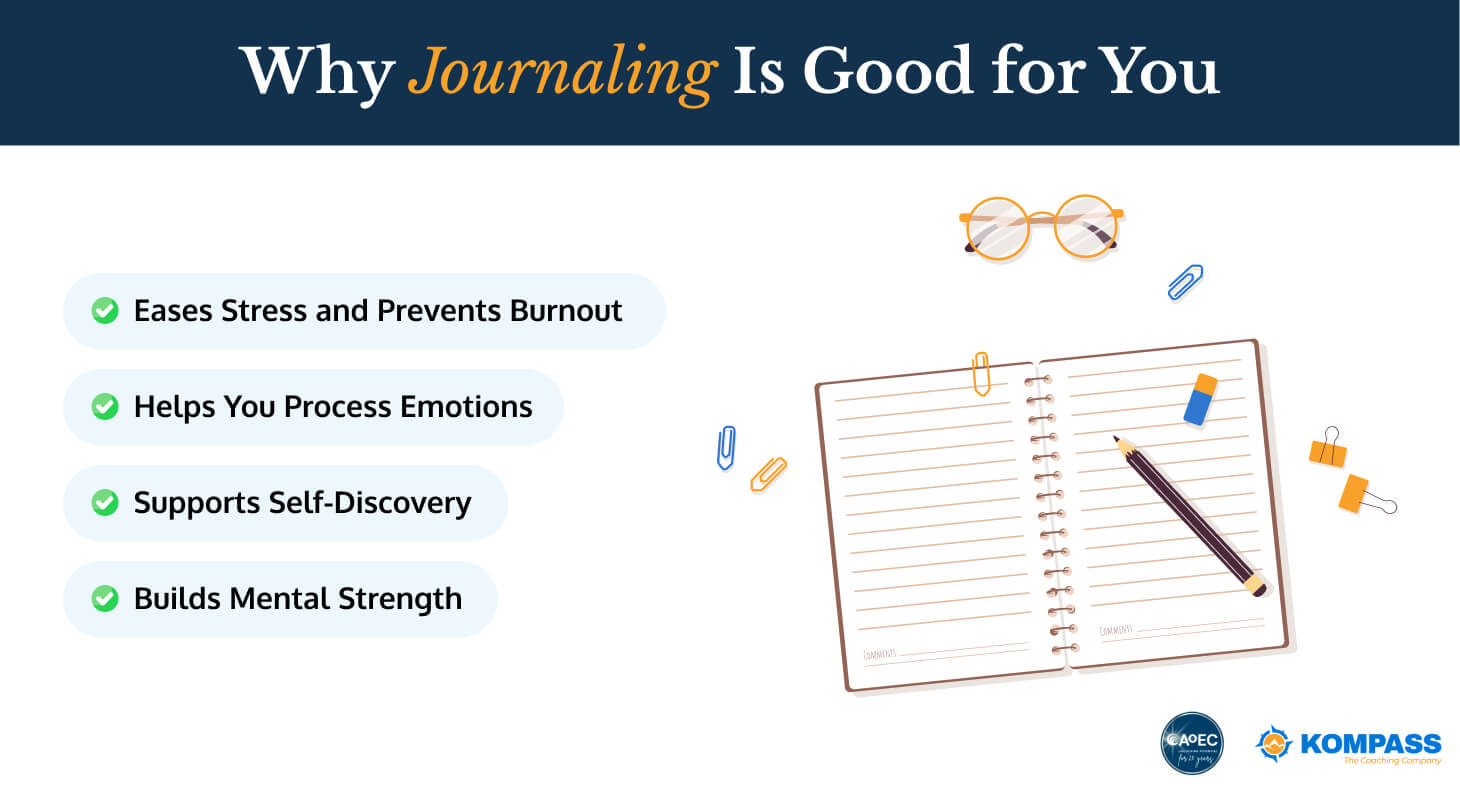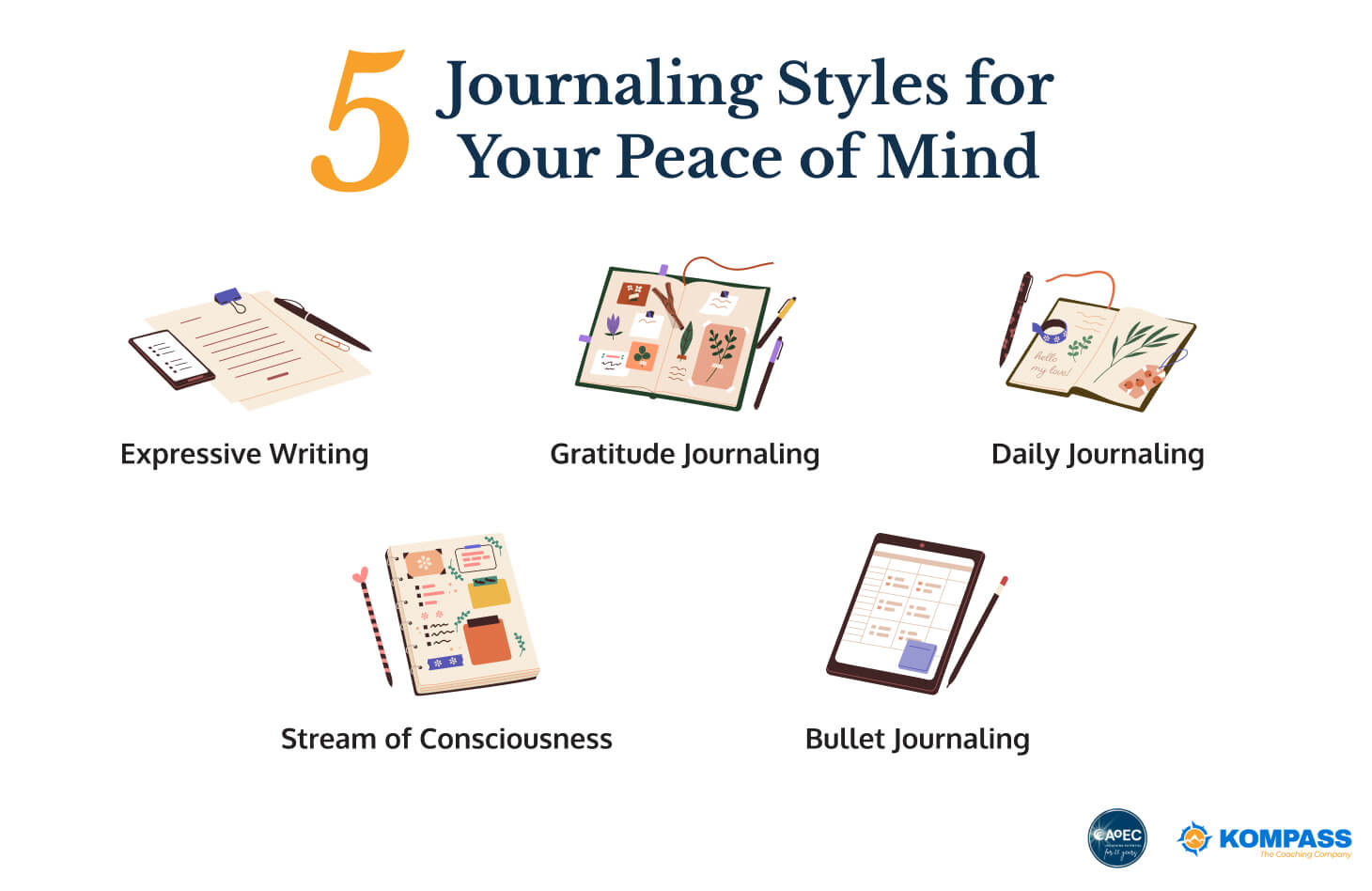You’re juggling deadlines, leading teams, and making decisions that impact lives—and yet, in the quiet moments, there’s still that feeling of being stuck and overwhelmed. Many high-achievers feel this way.
But actually, you don’t need to overhaul your life to gain clarity. You just need a pen, paper, and a few honest minutes a day.
Journaling is one of the simplest yet most powerful tools for personal growth. It helps you reflect on what matters and clear mental clutter. As a coach, I recommend journaling to clients who want to grow with intention—because it works. It builds resilience, boosts emotional awareness, and helps you make better decisions. Journaling is a habit that can quietly—but deeply—transform your life.
Why Journaling Works?
Journaling works because it helps you feel better and think more clearly—both at the same time.
When you write down what’s on your mind, you release emotions you may have been holding in. That emotional release creates space. It helps you feel lighter, calmer, and more grounded. Journaling helps you organise your thoughts. You start to see patterns, connect ideas, and get clear on what’s really going on inside you. That’s where change begins.
From a coaching perspective, this simple habit supports the very skills great leaders need—emotional awareness, clarity in decision-making, and resilience in times of pressure. Research even shows that journaling can reduce anxiety, lift your mood, and help you respond—not just react—to challenges.
And here’s something most people don’t expect: it helps your body, too. People who journal regularly often sleep better and even support their immune system.

The 4 Life-Changing Benefits of Journaling
1. Stress and Burnout Recovery
Journaling helps reduce stress and can prevent burnout.
When you take a few minutes to write down your thoughts, you give your mind a break. You create space between yourself and the pressure you’re feeling. This pause is often what’s missing in a fast-moving day. By writing regularly, you build a habit of slowing down and checking in with yourself.
Here’s how journaling supports recovery from stress:
-
It clears mental clutter and helps you focus on what matters
-
It gives you a healthy outlet to release tension
-
It helps you notice early signs of burnout, so you can respond early
-
It offers a moment of calm—even if the day isn’t calm
2. Emotional Processing and Acceptance
Journaling helps you understand and accept how you feel.
Sometimes emotions sit quietly under the surface. You may not even realise they’re there until you start writing. Journaling brings them into the open, where they’re easier to name and manage. This helps you respond thoughtfully instead of reacting in the moment.
What this looks like in practice:
-
Writing helps you recognise what you’re actually feeling
-
It creates space to pause and reflect, not judge
-
It supports you in letting go of thoughts that no longer help
-
Over time, you build emotional awareness and control
3. Self-Discovery and Identity Clarity
Journaling helps you get to know yourself better.
You may have goals, values, or patterns that you’ve never fully explored. Journaling is a way to uncover them. It shows you what’s important, what’s not, and where you might want to go next. This is especially helpful during life or career changes.
Why this matters:
-
You start to see what motivates or blocks you
-
You gain clarity on your values and what they mean for your choices
-
You can track personal growth over time
-
You begin to align your actions with who you really are
4. Resilience and Mental Fitness
Journaling strengthens your ability to handle hard things.
Life will always bring stress, change, and uncertainty. Journaling doesn’t remove those things—but it helps you build the tools to face them. You become more aware of your inner resources, and you learn how to bounce back with intention.
How journaling supports resilience:
-
It helps you reflect on challenges and what you learned from them
-
It reminds you of past wins, building confidence
-
It keeps your thoughts from spiralling
-
It supports calm, steady thinking when things feel uncertain

5 Types of Journaling Style for You
There’s no one way to journal. What matters most is finding a style that feels right for you. Below are five common styles. You can try one or combine a few—whatever helps you reflect and stay consistent.
1. Expressive Writing
Expressive writing is about putting your thoughts and emotions on paper.
This style is often used to explore difficult events or strong feelings. You write freely about what happened, how it felt, and how it’s affecting you now. There’s no structure to follow, and you don’t need to worry about grammar or spelling.
It can help you:
-
Process emotions you’ve been holding in
-
Make sense of a past event or challenge
-
Feel calmer and more in control
2. Gratitude Journaling
Gratitude journaling helps you focus on what’s going well.
In this style, you write down the things—big or small—that you feel thankful for. This helps shift your attention away from stress and towards what brings meaning or joy.
You can:
-
List three things you’re grateful for each day
-
Write short notes of thanks to people or situations
-
Reflect on what made you feel supported, calm, or encouraged
3. Daily Journaling
Daily journaling is a simple habit of checking in with yourself.
You write about your day—what happened, how you felt, and anything that stood out. Over time, it becomes a record of your growth, choices, and moments that mattered.
This can help you:
-
Spot patterns in your mood or behaviour
-
Track progress on goals
-
Stay grounded in the present
4. Stream of Consciousness
Stream of consciousness is free-writing without a plan.
You set a timer (maybe 5–10 minutes) and write whatever comes to mind. There’s no need to make it neat or clear. The aim is to empty your thoughts and see what’s under the surface.
It’s useful for:
-
Clearing mental clutter
-
Discovering thoughts you didn’t realise you had
-
Starting your day with focus
5. Visual or Bullet Journaling
This style uses visuals, structure, or quick notes instead of long writing.
You might draw, use symbols, or write in bullet points. Many people use it to track moods, goals, habits, or to plan their week.
It helps when you want to:
-
Stay organised
-
Reflect in a structured way
-
Use a mix of words, images, and lists
How to Start Journaling (Even If You’ve Never Done It Before)
Starting a journal doesn’t need to be hard. You don’t need to write pages or get everything right. What matters is showing up and making space to reflect. Here are three simple ways to begin.
1. Start Small, Start Real
The best way to start journaling is to keep it simple and honest.
You don’t need to write a full page. You can begin with one sentence or a short list. The goal is not to impress but to check in with yourself. Focus on what’s real for you in that moment.
Try this:
-
Write for 5 minutes a day
-
Use a notebook, an app, or a piece of paper—whatever is easy
-
Be honest, not perfect
This helps you build confidence and makes the habit easier to stick with.
2. Create a Safe Ritual
Having a regular time and space to journal makes it feel safe and familiar.
Choose a time of day when you can pause without distraction. Morning or evening works well for many people, but it depends on your routine. You don’t need a perfect setting—just one that feels calm.
Helpful ideas:
-
Keep your journal in the same place (e.g. beside your bed or at your desk)
-
Light a candle or make a cup of tea if that helps you settle
-
Let yourself write without pressure—this space is for you only
When journaling becomes part of your routine, it’s easier to keep going.
3. Use Prompts as Springboards
Prompts give you a place to begin when you’re not sure what to write.
They offer a question or topic to reflect on. This takes away the pressure of thinking up something on your own. You can respond in a few words or explore deeper if you want.
Here are some prompts to try:
-
“What do I need right now?”
-
“What am I avoiding?”
-
“What’s something that made me feel good today?”
-
“What’s one thing I learned about myself this week?”
Prompts help you get past the blank page and into a space of self-reflection. Over time, they can guide your thinking in useful and meaningful directions.

Building the Habit of Journaling From Occasional to Transformational
Making journaling a regular habit takes time, but it’s worth it. Small, consistent steps lead to real change. Here are three simple ways to help journaling become part of your daily rhythm.
1. Set realistic expectations
You don’t need to write every day to benefit from journaling.
It’s okay to miss a day—or even a few. What matters more is returning to it when you can. Trying to be perfect can create pressure, which makes it harder to keep going. Instead, aim for progress, not perfection.
Tips to keep in mind:
-
Start with 2–3 times a week
-
Be kind to yourself if you miss a session
-
Focus on how it feels, not how much you write
Over time, this builds trust in yourself and your process.
2. Pair journaling with another habit
Linking journaling to something you already do helps you stay consistent.
Habits are easier to build when they have a natural place in your day. Think of journaling as part of a routine, not something extra. You don’t need a lot of time—just a few minutes in a familiar space.
Try pairing it with:
-
Your morning tea or coffee
-
Your evening wind-down routine
-
A short break during your workday
This makes journaling easier to remember and more likely to happen.
3. Track progress—notice patterns, improvements, breakthroughs
Looking back at what you’ve written helps you see how far you’ve come.
It may not feel like much at first, but small entries add up. Over time, you’ll notice patterns in your thoughts, moods, or habits. You might even spot ideas you hadn’t seen before. This reflection is where real growth happens.
What to look for:
-
Themes that keep coming up
-
Progress on personal or professional goals
-
Moments of insight or clarity
Tracking what you’ve written helps make the habit meaningful. It reminds you why you started and shows you the value of staying with it.
Common Challenges in Journaling and How to Overcome Them
Journaling can be difficult at times, especially when you’re just starting.
Many people struggle with knowing what to write, staying consistent, or facing uncomfortable emotions. These are all normal. The key is not to avoid the challenge but to find a way through it that works for you.
Here are common challenges in journaling and how to overcome them:
-
“I don’t know what to write.”
Use simple prompts to begin. Start with a sentence like “Today I feel…” or “One thing on my mind is…”. Writing anything is better than nothing. -
“It feels uncomfortable.”
Writing about emotions can be hard. It’s okay to take it slow. You don’t need to go deep every time. Just write what feels safe. -
“I forget to do it.”
Link journaling to a daily routine, like having tea or brushing your teeth. Keep your journal where you’ll see it. -
“I lose interest.”
Try a new journaling style or format. Some days you may want to write, other days draw or list ideas. Make it flexible.
The goal is to keep going, even when it’s not perfect. That’s how habits are built.
Final Words from Your Coach: Make Journaling Your Own
Journaling isn’t about doing it a certain way—it’s about finding what works for you. You don’t need to write every day or follow a set format. Start with what feels manageable, and give yourself permission to change your approach as you go. This is your space to reflect, explore, and learn without judgement.
Over time, journaling becomes part of how you lead yourself through life. Whether you’re managing stress, making decisions, or simply needing time to think, this simple practice can help you stay grounded and move forward with purpose. Trust that even a few honest words on a page can make a difference.
Frequently Asked Questions
1. What does journaling really mean?
Journaling means writing down your thoughts, feelings, and experiences to better understand yourself. It’s a tool to reflect, manage stress, and create space for clearer thinking.
2. How can I begin journaling if I’ve never done it before?
Start small—just write one sentence about how you feel or what’s on your mind. Use a notebook, app, or voice note, and aim for a few minutes a few times a week.
3. Is there a difference between a journal and a diary?
Yes. A diary usually records daily events, while a journal focuses more on personal reflection, thoughts, and growth.
4. What should I avoid when journaling?
Avoid judging what you write or trying to make it perfect. Don’t force yourself to write if it adds stress—this is a space for you, not for anyone else.
5. Is it okay to journal every day?
Yes, it’s okay to journal daily if it feels helpful. Even five minutes a day can support mental clarity and emotional balance. Just make sure it stays manageable and not forced.







